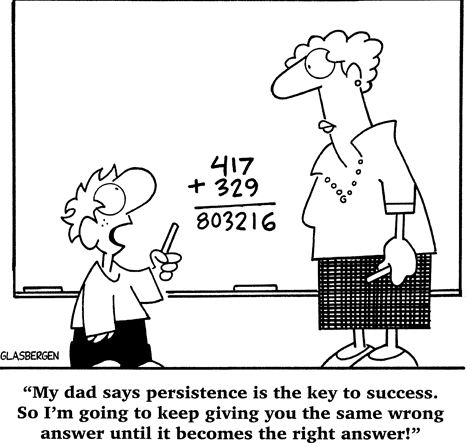by Charles Plant | Jun 12, 2014 | Leadership Development

You would think from the comments to my last blog that people feel very guilty when they procrastinate. I find that really funny as I never feel guilty when I procrastinate.
Apparently, there are three types of procrastinators, Delayers put things off for all sorts of reasons, Perfectionists don’t let go of something until it is perfect and Distractibles are people who are easily distracted by bright shiny objects.
No matter what type of procrastinator you happen to be, most people seem to feel some form of guilt, anxiety, dissatisfaction, depression or self-loathing when they procrastinate.
Silly, silly, silly. This must be something like left-over guilt from toilet training when one is young. After all, if you aren’t late at delivering something you promised,who cares if you did it at the last minute or weeks ago? Why do we think it is better to do things early that to do it late. After all, what does it really matter when you do it, as long as it is of acceptable quality and on time?
In fact the way I think about it, there are a bunch of benefits to procrastinating when trying to do something:
- Whatever you have to do might get cancelled before you get to it.
- You get to do things you like more first.
- You get more time to figure out what to do. (If I had more time I would have written a shorter letter.)
- You can get it all done at once.
So it’s time to take off the shackles of unwarranted value judgements designed in the Victorian age to benefit the early bird who gets lots of worms. Stop feeling guilty about doing things at the last minute. Who really cares when you do something?
Procrastination is much better that not getting stuff done. These are the people who really should feel guilty, the ones who don’t produce. And the funny thing is that the non-producers don’t feel guilty about their lack of production. So why should you feel guilty about procrastinating?
by Charles Plant | Jun 2, 2014 | Leadership Development
 I have a friend who considers herself to be a terrible procrastinator and yet she is one of the most productive people I know. If you look up stuff on procrastination online, you’ll get all sorts of information on how bad it is to procrastinate and how you can overcome this horrid tendency in 5 easy steps.
I have a friend who considers herself to be a terrible procrastinator and yet she is one of the most productive people I know. If you look up stuff on procrastination online, you’ll get all sorts of information on how bad it is to procrastinate and how you can overcome this horrid tendency in 5 easy steps.
So if procrastination is so bad, how is it that my friend can be so productive? Maybe we have it all wrong, maybe procrastination is actually a good thing.
First lets look at what procrastination is. Various sites define procrastination as “the practice of carrying out less urgent tasks in preference to more urgent ones, or doing more pleasurable things in place of more pleasurable ones.” It is also defined as “the act or habit of procrastinating, or putting off or delaying especially something requiring immediate attention.” “To postpone or delay needlessly.”
Now this friend of mine fits the bill to a T. If she has something that just has to be done for work and she doesn’t want to do it, she’ll do anything else instead. When she should be working the weekend on a report, she’ll spend the time tidying her place, cleaning, doing errands, laundry, almost anything other than doing the report.
If you notice the definitions of procrastination and the description of my friend’s activities, you’ll notice something interesting. Procrastinators are not people who do nothing, they just happen to do things in an order that would seem to be counter-productive, less important before more important.
And when I look at it that way, procrastination doesn’t seem all that bad. You’re still getting stuff done, just perhaps not in the order that would seem to make sense.
by Charles Plant | May 12, 2014 | Leadership Development
 If you’re an entrepreneur, you’re told that you must be persistent, that persistence will make you successful and I suppose that the same thing is told to many people in developing their careers. But what do you be persistent about?
If you’re an entrepreneur, you’re told that you must be persistent, that persistence will make you successful and I suppose that the same thing is told to many people in developing their careers. But what do you be persistent about?
Many people seem to think that being persistent means doing the same thing over and over again until somebody pays attention to what you’re doing. That, unfortunately, as I have seen recently, is just wrong headed. (Or in my case, pig headed.)
If battering your head against a closed door is being persistent and that won’t work then what things are you supposed to be persistent about? I’ve been trying to come up with a list of four things that entrepreneurs need to be persistent about and here they are:
- Innovating – As an entrepreneur or even as an employee you must be constantly innovating. Being persistent at changing what you’re doing may eventually make you successful.
- Networking – Yes, I know I have mentioned that I hate networking but if you want to find your tribe (thanks Seth Godin) you must be persistent about networking.
- Listening – Networking isn’t about telling your idea, it’s about listening to their problems. Persistent listening will uncover more that you ever find by telling.
- Learning – Finally, if you’re networking and listening then you might learn. It is the persistent learner that then becomes the best innovator and you end up back at the beginning of this list. (Lather, rinse, repeat.)
by Charles Plant | May 5, 2014 | Leadership Development
 So if you are not analytical, how do you make decisions? Are you in fact even conscious of the way you make decisions? I thought not.
So if you are not analytical, how do you make decisions? Are you in fact even conscious of the way you make decisions? I thought not.
I guess we all do it but essentially, if you make decisions using only one way, it means that you’re ignoring different ways you can make decisions. If you’re being analytical, then perhaps you’re ignoring what your emotions say.
Or if you’re making decisions emotionally, then perhaps you’re ignoring any analysis which might be available.
All of the stuff on emotional intelligence would say that you should be conscious of your emotions when making decisions but there is a catch here. To be conscious of your emotions, you must become analytical. And if you’re analytical, it is likely that you do not pay enough attention to your emotions.
And this is where everything breaks down. Most people just are not analytical so by virtue of this, they can’t become emotionally intelligent. Interesting conundrum isn’t it?
To become more emotionally intelligent you must be more analytical. Seems counterintuitive but it really rests at the crux of a lot of problems.
by Charles Plant | Apr 29, 2014 | Leadership Development
 I just read a report that says that analytics is the next big thing in digital marketing. I’ve been listening to James Standen of nModal say this same thing for several years and I’m beginning to see that this might be true, to a point.
I just read a report that says that analytics is the next big thing in digital marketing. I’ve been listening to James Standen of nModal say this same thing for several years and I’m beginning to see that this might be true, to a point.
Overall I don’t think many people are really into analytics. I was talking to several people at a client’s yesterday about some potential analytics for their business and got a lukewarm response.
I went home reminded that while I am REALLY into analytics, not everyone else is. (Yes, I know, there are some of you who are making snide comments because I am an analytics nerd.)
It made me think back to all of the fascinating (well they were to me) analytics based reports I have done in the past. To me they were incredibly mind blowing, strategy altering, and revealing pieces of data with great import. To many who read them though they were a big whoop, not that the information wasn’t new but they just didn’t seem to care.
I have even gone so far on two occasions to start businesses based on new data or on different ways of looking at data and got very spotty market response.
So why is it that people just are not into analytics for the most part. And if they don’t like analysis, how do they get the right information to make decisions?
(And by the way, for those of you who thought you knew where the word analytics comes from you are probably wrong. It is from the Greek “analuein” which is the concatenation of “ana” meaning up and “lysis ” meaning a loosening, ergo: loosening up.)





